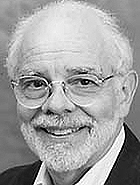Of course we define ourselves — don’t we? Where do our notions of identity originate? Are we free to choose our own identities? How are they formed, and how do they change over time?
Gerald N. Izenberg, Ph.D., professor of history in Arts & Sciences, will examine the complex notions of identity in a series of programs beginning with the Assembly Series lecture at 11 a.m. March 21 in Graham Chapel.

Expanding on this theme, he will give a talk on “The Varieties of ‘We’: Collective Identities and their Conflicts” for The Center for the Humanities in Arts & Sciences, for which he is a faculty fellow. The lecture begins at noon March 23 in McDonnell Hall, Room 162.
The final event, provided for Alumni & Development Programs’ Century Series, will be on “What, If Anything, Does Democracy Owe Identity?” at 5:30 p.m. March 26 in Lab Sciences 300.
A scholarly interest in what psychologist Erik Erikson termed “the identity crisis” led Izenberg, an expert in European intellectual history of the 19th and 20th centuries, to a subspecialty in psychohistory. Psychohistory uses psychological and psychoanalytical theories and methods to provide a more profound understanding of historical personalities and events.
In his book, “Impossible Individuality: Romanticism, Revolution and the Origins of Modern Selfhood,” Izenberg added a psychological dimension to the traditional examination of political, social and cultural developments to show how four major figures — Karl Wilhelm Friedrich Schlegel, Friedrich Daniel Ernst Schleiermacher, William Wordsworth and François-René de Chateaubriand — created a modern concept of the self.
In “Modernism and Masculinity,” Izenberg examined the role the modern concept of masculinity played among leading European writers and artists of the modernist revolution before World War I.
In these books, and in essays such as “The Self in Question” in the journal Modern Intellectual History, Izenberg’s investigation into the “self” has contributed significantly to this growing body of literature and has placed him among the country’s most accomplished historians of the concept of self.
A three-time recipient of the University’s Teaching Award in the Humanities, given by students, Izenberg was recognized with a Distinguished Faculty Award in 1996.
Izenberg joined the University as associate professor in 1976 and became a professor in 1991. He helped create the Program in Literature and History, which he co-directed from 1977-2004.
He earned a bachelor’s degree from University College, University of Toronto in 1961 and master’s and doctoral degrees from Harvard University in 1962 and 1968, respectively.
Additionally, he studied in Zurich, Switzerland, and received a certificate in psychoanalysis from the Boston Psychoanalytic Institute.
In 1995, Izenberg received a diploma from the St. Louis Psychoanalytic Institute. Since then, he has been active in the St. Louis Institute, serving as president from 2003-05.
The Interdisciplinary Project in the Humanities in Arts & Sciences is sponsoring the trio of talks.
The Assembly Series talk is free and open to the public.
For more information, visit assemblyseries.wustl.edu.